Interested in knowing what types of RV’s are there out there?
The different types of RVs are:
- Motorhomes
- Class A Motorhome
- Class B Motorhome
- Class C Motorhome
- Towables
- Travel Trailer (including teardrop trailers)
- Fifth wheel
- Pop-up camper (tent trailers)
- Truck Campers
RV's - aka Recreational vehicles - come in all sizes, shapes, and floorplans, to suit the tastes and needs of various owners. From the smallest towable trailer to a substantial 40-foot long diesel-powered bus-sized motorhome, anyone can find the best type of RV that will suit their RV'ing style best.
[toc]
Motorhomes Vs. Towable RV Units
To tow or not to tow – that is the question.
The basic division in recreational vehicles is between
- Motorhomes: RV’s that drive themselves.
- Trailers/Campers/5th wheels: RV's that need to be towed.
- Truck camper - an RV that's literally carried on top of a pickup truck (no wheels of its own).
Let's look into the options in each RV category.
Motorhomes
Motorized and self-contained, motorhomes have all the amenities of home in a single motorized vehicle. These are not trailers and you don’t tow them – you just drive them around. Many full-time RV’ers choose to tow a small car along with them but the roles are reversed. Instead of living in a towed trailer, they tow a small car behind their RV, affectionately calling that car a “toad” (as in “towed”, get it?)
Motorhomes are generally divided into classes, tagged by the letters A, B and C. Let’s find out what each of these classes actually is.
What’s A Class A Motorhome?
Ever seen an RV that looks like a transformed bus? That’s a Class A motorhome.
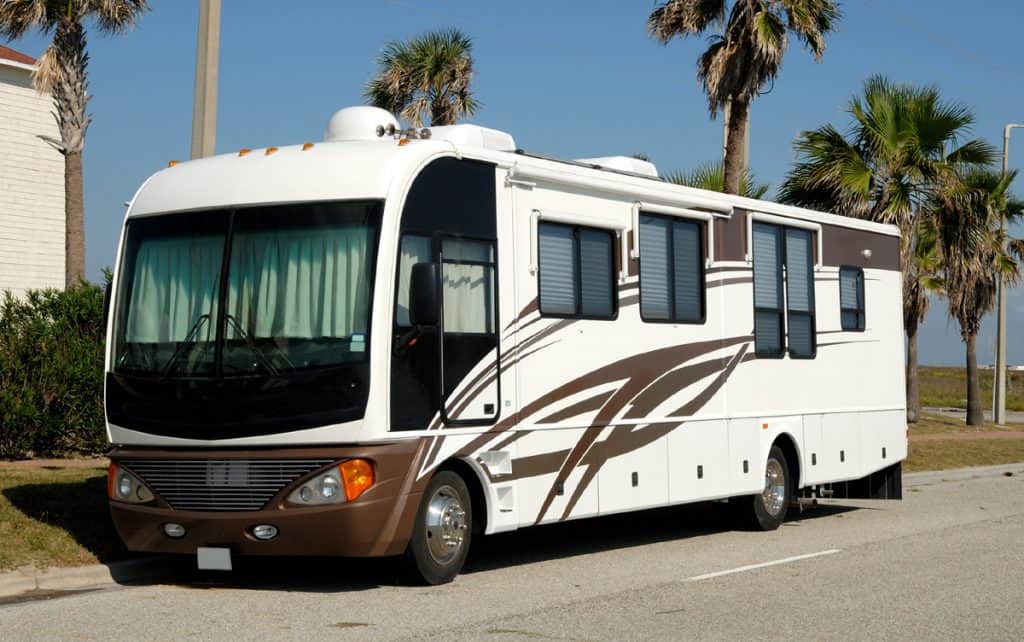
Ranging in size from 21 to 40 feet, class A motorhomes come in a broad array of configurations. Some class A recreational vehicles have amenities that equal the most luxurious homes.
Features may include a “basement” for storage, full-size kitchens, and king-size beds, to mention a few of the elegant offerings of these road cruisers. Push button slide outs can expand their living space when so equipped, which adds several square feet of floor area.
Class A motorhomes are more expensive than other types of RV’s. Then again, they’re large and contain both the towing vehicle and the living space which naturally affects their price range.
Example of Class A motorhomes
What’s A Class B Motorhome?
Class B RV’s are sometimes called “van conversions” or camper vans. As the name suggests, they're built over a van chassis, so imagine a large van, remove the several rows of seats a van usually has, and install beds, chairs a small bathroom and maybe a kitchenette. That’s a Class B Motorhome.
In lengths of 16-22 feet, class B RV’s are the smallest of the three classes of motorhomes. Their smaller size and maneuverability make parking class B’s relatively easy when shopping or searching for the perfect Creekside spot.
Although class B types of recreational vehicles are not as large as class A’s and C’s, they are well appointed and able to accommodate two in relative comfort. Full stand up room makes moving about easy. It’s usually accomplished by raising the roof and/or dropping the floors to achieve ample headroom for occupants.
Example of a Class B Van RV
What’s A Class C Motorhome?
If class A is like a bus conversion and Class B is a van conversion than you could call Class C a large pickup truck conversion using a truck chassis. Which is basically what these motorhomes are. It’s easy to recognize a Class C RV by the extension over the “truck cabin” aptly called the “cabover”.
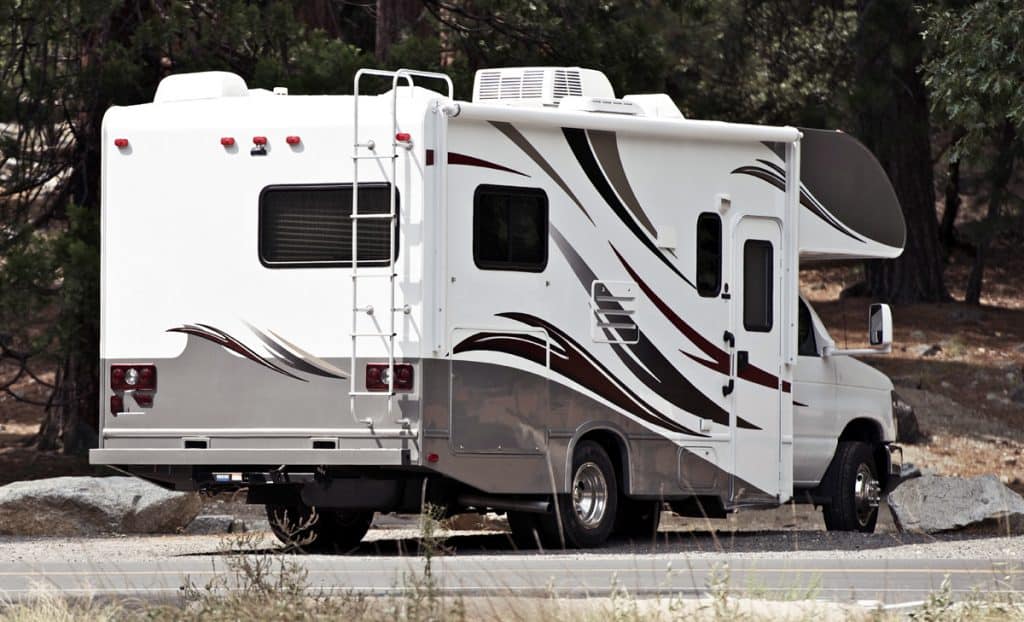
Class C motorhomes range in size from 21-35 feet in length. The cab-over section can be configured as storage space, or as a large bed in most class C units.
Living areas of class C motorhomes include kitchens, bathrooms, storage, entertainment systems, and sleeping space for two to six people. Powered by gas or diesel engines, they can be used to tow a small vehicle that can be used to run around in once you set up camp.
Class C RV example
Towable RV’s
Unlike motorhomes, towable types of recreational vehicles require a truck (or sometimes SUV or car) to move them down the road. You can tow one of the following types –
- Travel Trailer (including a teardrop trailer)
- Fifth wheeler
- Pop-up camper
Travel Trailers (Camping Trailers)
As the name suggests, these are live-in units that you can tow behind your vehicle. In sizes from 11 to 45 feet, conventional travel trailers can be small enough to be towed by a sedan (in theory, at least…) or large enough to require a large heavy-duty truck.
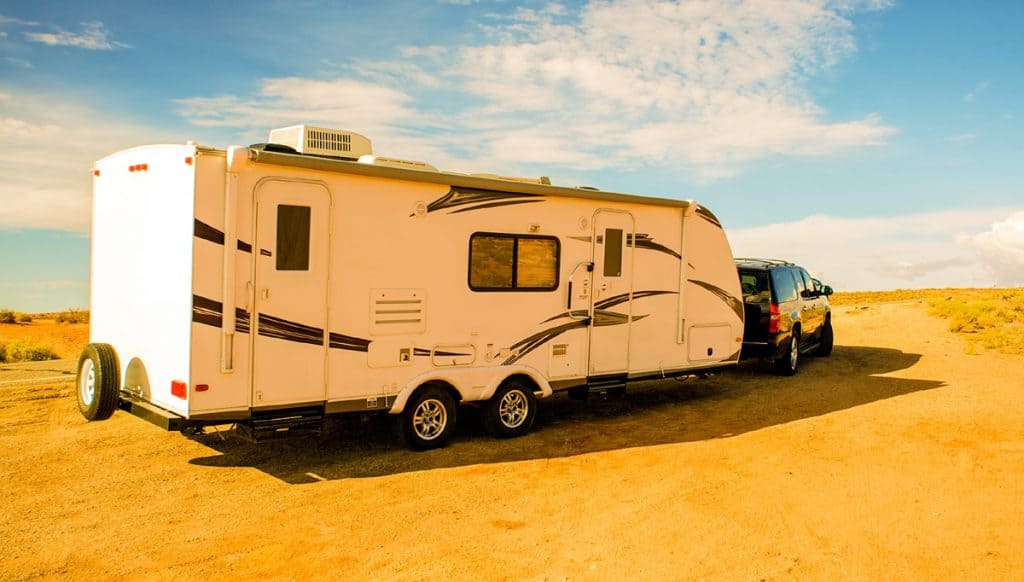
Usually, even the smaller trailers have what a couple of people need for a weekend trip and include spacious beds, a bathroom, and a cooking area all contained in a small package.
Amenities and features are dependent on the size of the travel trailer you choose. Small units offer minimal accommodations. That said, some modest units utilize their floor space so well that bathrooms, functional kitchens, queen size beds, and ample storage can be found in travel trailers as short as 17 feet.
Popular in the fifties, teardrop trailers have made a comeback in recent years. They offer a bed for two, a small rear kitchen and an affordable price. Buyers can find refurbished older RV’s, or you can see one of the newest designs at a local dealer.
Example of a Travel Trailer
Keystone Hideout Travel Trailer
Teardrop Trailers
Popular in the fifties, teardrop trailers have made a comeback in recent years. They offer a bed for two, a small rear kitchen and an affordable price. Buyers can find refurbished older RV’s, or you can see one of the newest designs at a local dealership.
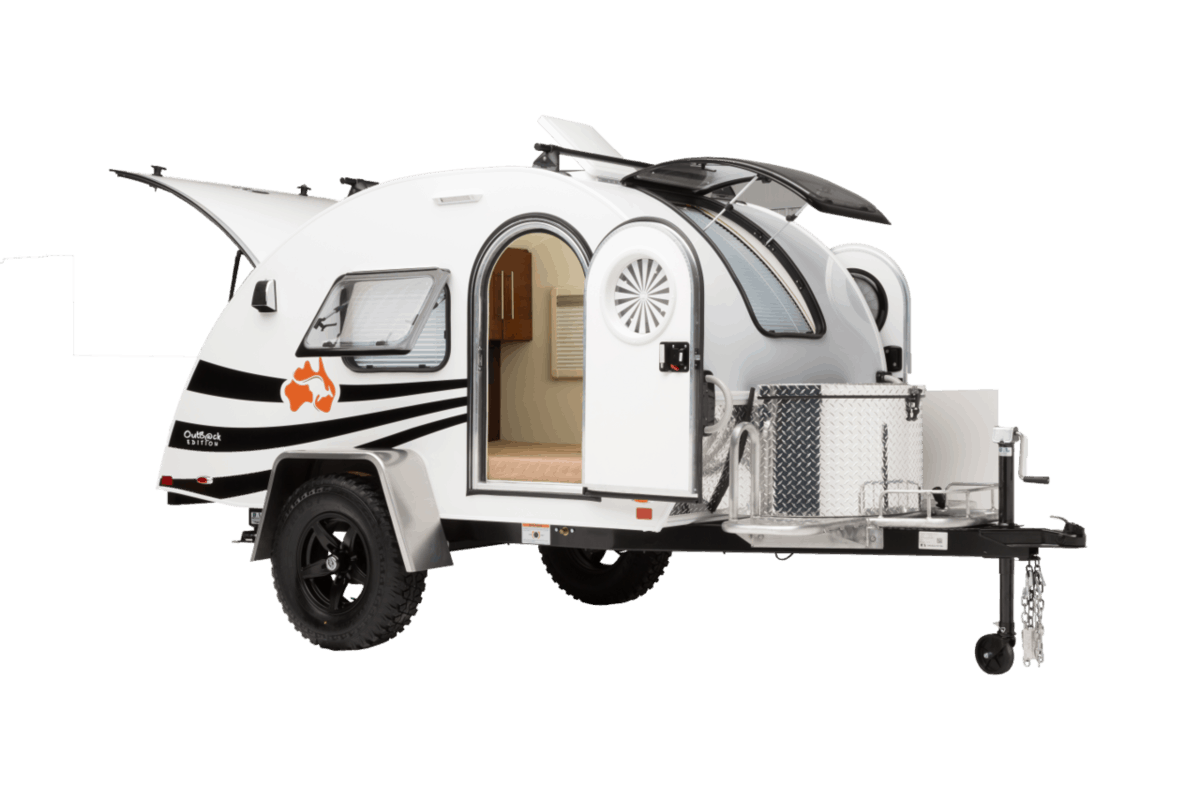
Expandable Trailers
Ranging in size from 19–30 feet, expandable trailers are simply those that have additional tent/canvas based extensions in the front and back. Like most trailers, they can be towed with SUVs and smaller pickup trucks.
Motorhomes and trailers with slide outs can also be considered expandable, but their slide outs are hard-shelled. “Real” expandable trailers have canvas-covered extensions that fold down. It’s a bit like tenting in a trailer.
With more amenities than their pop-up style siblings, expandable types of recreational vehicles have kitchens, bathrooms and showers, queen size beds in some units, and other features depending on the size unit you buy.
Fifth Wheels
A 5th wheel is a lot like a trailer, except that it sits on top of a pickup truck bed, allowing for a more stable towing experience. In other words, you need a pickup truck to tow a 5th wheel.
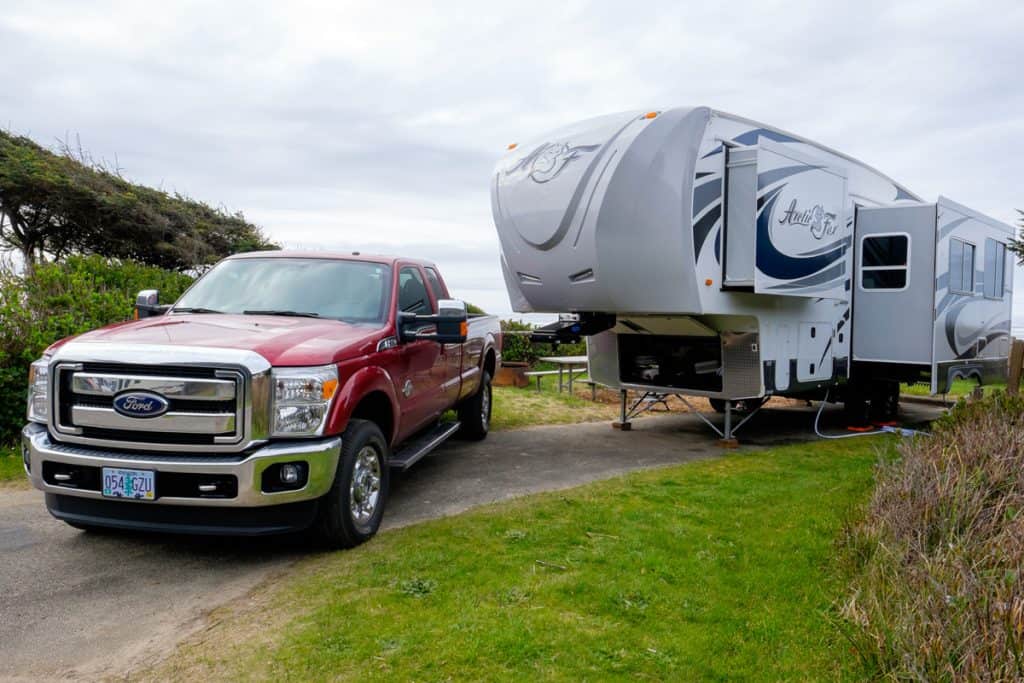
Fifth wheel trailers are often heavier than regular travel trailers of the same length. They are typically equipped with the luxury of an elegant home and have full kitchens, bathrooms with showers, entertainment centers, and ample storage.
Fifth wheelers can be equipped with up to four slide outs, expanding the living area to that of a small cabin or home. The large rear window offers panoramic views, and the ability to detach your vehicle once you set up camp allows you to use your tow vehicle for further adventures and trips for provisions.
New to RVing and not sure what the term “Fifth Wheel” even means? The answer is here.
Pop-Up Campers
When we went on our first US road trip we noticed people towing a strange flat rectangular trailer with no visible doors or windows. Definitely without enough room for anyone to stand or even sit in. The only indication that these trailers were meant for human habitation was the AC unit. I now know that these contraptions were pop-up campers. As the name suggests, once you park them in a campground, you can press a few buttons and they magically pop-up into trailer homes.
Watching a pop-up turn from a flat rectangle into a small home is like watching a magic show. Here’s what it looks like in high-speed –
Also known as folding trailers, pop-ups range from 8-24 feet in length and can sleep up to eight. Most folding trailers offer kitchen areas, dinette tables, and beds. Smaller units may have porta potties instead of a bathroom, while some larger RV’s have enclosed bathrooms with showers.
Example of a 5th wheel trailer
Toy Haulers
These types of recreational vehicles are not always considered a class in their own right. At heart, they are RV’s – usually 5th wheelers – designed to live in with space to haul your ATV’s, motorcycles, or bicycles (aka “the toys”).
The living spaces of toy haulers are more compact than other trailers but can include powered slide-outs to expand living areas.
Horse Haulers are a special type of toy haulers. As the name suggests, these are RV’s that are designed to take horses as well as humans on board.
Truck Campers
Sometimes listed as towable in used RV sites, truck campers are a separate type altogether and there’s actually no towing involved here.
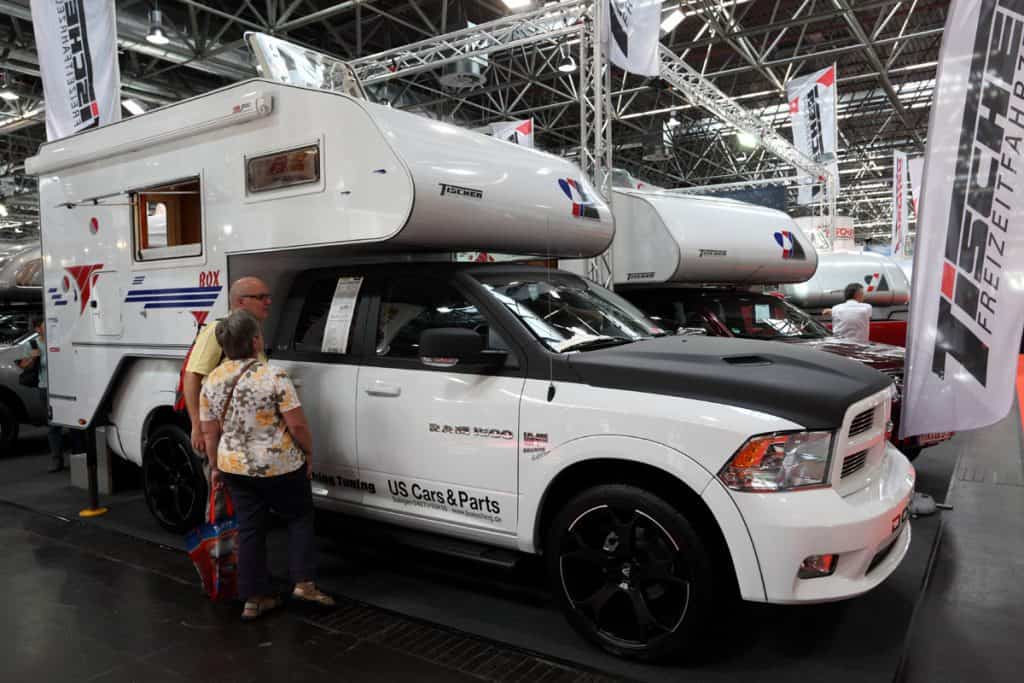
A truck camper is a smallish unit that has no wheels whatsoever. You literally put it on top a pickup truck and drive away. You can set it up in a campground by pulling out its “legs” and driving the truck from underneath the camper. Some people just weld a camper on a truck, essentially creating a makeshift tiny Class B motorhome. Usually when people say “truck camper” they mean a detachable unit.
Truck campers range in size from 8-20 feet and require a vehicle matched to their weight. Popular in the 1970’s and 1980’s they first arrived on the scene in the 1950’s. These units can have all of the conveniences of a trailer, like a kitchen, queen sized over cab beds, and bathrooms with showers.
Pros And Cons Of Various RV Types
In order to choose the right RV for you, you need to take a multitude of considerations into account. Here’s a quick review of the pros and cons for each option.
Class A Motorhomes
Pros:
- Large and roomy, especially with additional slideouts.
- A single space for living and driving – easier to get to anything in the RV when driving.
- Large front windows mean you get a great view all around you while driving.
- Very easy to get into and out of campgrounds – just park and hook up on arrival and then disconnect and move on whenever you want to leave.
Cons:
- Expensive.
- Once in the campground, you may need a smaller towed vehicle to get around in.
Class B Motorhomes
Pros:
- Easy to maneuver due to the small size (compared to other motorhomes).
- A single space for living and driving – easier to get to anything in the RV when driving.
- No need to tow a smaller car.
- Most affordable of all motorhomes.
- Easy to get into and out of campgrounds – just park and hook up on arrival and then disconnect and move on whenever you want to leave.
Cons:
- Limited living space.
- Suitable for 1-2 people – not a large family.
Class C Motorhomes
Pros:
- Can be large and provide as much living space as a Class A
- Strong truck engine.
- A single space for living and driving – easier to get to anything in the RV when driving.
- The additional sleeping area above the cabin.
- Easy to get into and out of campgrounds – just park and hook up on arrival and then disconnect and move on whenever you want to leave.
- Easy to find through rental companies so you can rent to test.
Cons:
- Large Class C motorhome will be difficult to move around and require a towed car.
- Can be expensive.
Travel Trailers
Pros
- Very affordable relatively to living space.
- Lightweight (some models can be towed with smaller vehicles).
- No need for additional vehicles once in the campground – just disconnect and use the towing vehicle.
Cons
- Requires a towing vehicle (extra cost).
- Towing can be challenging, especially with side winds.
- The living area is separate from the driving area.
- Can be difficult to maneuver into a campground spot.
- Takes time to disconnect from towing vehicles and reconnect again when leaving the campground.
5th Wheel
Pros
- Large and roomy (especially with slideouts).
- Easy to tow – the gooseneck hitch reduces sway.
- No need for additional vehicles once in the campground – just disconnect and use the towing vehicle.
Cons
- More expensive than a trailer.
- Tends to be heavy and require a suitable towing vehicle (usually at least a 3/4 ton truck).
- The living area is separate from the driving area.
- Can be difficult to maneuver into a campground spot.
- Takes time to disconnect from towing vehicles and reconnect again when leaving the campground.
Pop-Up Camper
Pros
- Lightweight (some models can be towed with smaller vehicles or just offer better fuel economy).
- Very affordable (cheapest of all options listed here).
- Towing can be challenging, especially with side winds.
- No need for additional vehicles once in the campground – just disconnect and use the towing vehicle.
Cons
- The living area is separate from the driving area.
- Longer setup time – you need to unfold the camper.
- Less insulation against the elements (tent-like roof).
- Usually small and doesn’t always include a bathroom.
Truck Camper
Pros
- No setup time unless you're camping long-term.
- No towing issues.
Cons
- The living area is separate from the driving area.
- Very tall – can be difficult to drive under some conditions.
- Usually small and doesn’t always include a bathroom.
- Limited living space.
- Suitable for 1-2 people – not a large family.
Find the Type of Recreational Vehicle that suits You
With all of the choices available, choosing a recreational vehicle can be confusing. And just in case you've already have a preference, let us know what it is in this super quick poll -
If you found this post useful, please leave me a comment to let me know. Also, if you already own one of these types of recreational vehicles, I’d love to hear from you. What do you like and don’t like about it and why you chose it.

I love to do anything that is outdoors related. I’m looking to get a new trailer for my truck. I’ll probably get a 5th wheel as I have never used one of those before.
Well I bought one and I love the room. And two it’s permanently parked. I wouldn’t attempt pulling it… lol